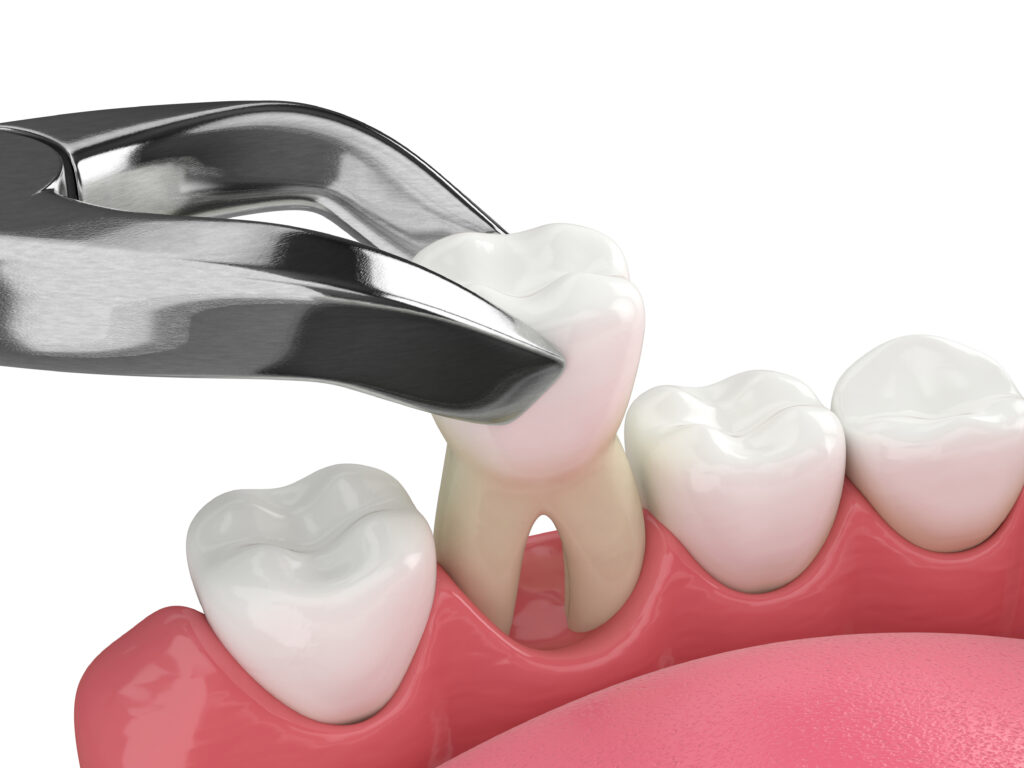You might require a tooth extraction if you have a tooth that is badly decaying or damaged, has suffered dental trauma, or has dental crowding. This includes extracting a tooth from its jawbone socket, which can be accomplished either non-surgically or surgically. You can follow our step-by-step guide to learn about the tooth extraction procedure, including what to expect before and after the treatment.
When is Tooth Extraction Recommended?
When feasible, our dentist prefers to preserve natural teeth. However, there are cases when added restorative measures, like dental fillings or crowns, are needed. In case your tooth has suffered huge damage that cannot be repaired, removal may be needed. A broken tooth extraction may be advised by our dentist if you:
•Severe cavities in the teeth.
•A broken tooth.
•A damaged tooth.
•Packed teeth.
•A severe gum condition.
•Tooth luxation or other damage to the teeth
What Happens During a Tooth Extraction?
Our dentist will look at your afflicted tooth and the gums surrounding it. Further, our dentist will take dental X-rays to understand the level of the bone and the severity of the pain. In some cases, you might also need same day tooth extraction near you. Tell our dentist about any prescription drugs, over-the-counter remedies, or vitamins you take. The alternatives for processing and sedation will be thoroughly discussed with you after all the necessary data has been gained.
Many medical professionals administer sedation during dental treatments like tooth extractions. For those who experience dental anxiety or who just want to feel more at ease during their treatment, sedation is a fantastic alternative. The below list of sedatives are used in dentistry:
•Nitrous oxide.
•Oral sedation.
•Intravenously (IV).
•Deep sedation.
What are the Advantages Of Pulling a Tooth?
The benefits of tooth extraction are numerous. Most importantly, it lessens severe germs that might hurt your teeth. A damaged tooth can spoil your smile and lead to other problems if it is not needed. Your best chance of achieving ideal dental health is to have your impacted tooth extracted. Additionally, if your tooth is seriously cracked or infected, an extraction can help relieve dental discomfort almost immediately. Thus, reach out to your nearest tooth extraction clinic and get the treatment done.
How Long Does It Take to Recover After Having a Tooth Pulled?
The process of removing a tooth from its socket varies based on a number of variables. One factor to consider is the tooth’s position. It will take longer to remove wisdom teeth than front teeth. The strength and stability of a tooth in the jawbone are influenced by the number of roots it has.
To guarantee effective healing, you must take care of the area. This involves abstaining from smoking or using straws, eating soft foods, and taking medication as directed to lessen discomfort and lower the risk of infection. Beginning the day after the extraction, gently rinse your mouth with warm salt water before carefully brushing and flossing the remaining teeth. Contact our dentist near you right away to set up a follow-up consultation if you feel any discomfort, bone fragments, or spurs.
Depending on how your situation is, the majority of people return to normal in a few days. Within 72 hours, you can resume your activities, but it normally takes several weeks for the jawbone to be fully retrive. As a result, you’ll mostly need to wait a few months to have a dental implant if you want to get rid of the tooth with one.
Seeking Dental Extraction?
After having a tooth extracted, you can fully recover with the right attention and care. The optimum outcome for your oral health can be achieved with the assistance of our skilled dental staff at Albany Dental.
You can reach us by calling our clinic, sending a message via our website, or coming to visit us in person.
